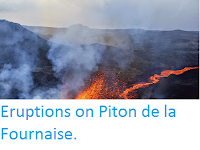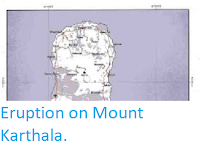The Observatoire Volcanologique du Piton de la Fournaise reported a sharp rise in seismic activity beneath Piton de la Fournaise, an active volcano on Réunion Island, an overseas department of France in the Indian Ocean, from the middle of February onwards. Such activity often signifies magma moving through chambers beneath a volcano, and therefore can be a precursor to volcanic eruptions. On 23 March the observatory measured a rise in carbon dioxide and sulphur dioxide being produced in fumaroles from the summit of the volcano, then on 3 April an intermittent fissure about a kilometre in length opened up on the north flank of the mountain, which two lava fountains could be observed. This was accompanied by further seismic activity, triggering a number of landslides on the volcano's flanks.
A lava fountain on the north flank of Piton de la Fournaise on 3 April 2018. ipreunion.
Piton
de la Fournaise is believed to have been active for about 530 000
years, though its geology is complicated to unravel as lava flows are
interbedded with those from Piton des Neiges, a larger, older and now
extinct volcano to the northwest, which is responsible for the formation
of about two thirds of the island. The island sits on the Réunion
Hotspot, a deep mantle plume which is thought to have been active for
about 66 million years, originally forming under what is now
northeastern India, where it was responsible for the Deccan Traps flood
basalts, then moving southward across the Indian Ocean (or more
precisely sitting still while the continental plate upon which India and
the Indian Ocean sit moves to the north), over time forming the
Laccadive Islands, the Maldives, the Seychelles, Rodrigues Island,
Mauritius and Réunion.
See also...
Follow Sciency Thoughts on Facebook.







